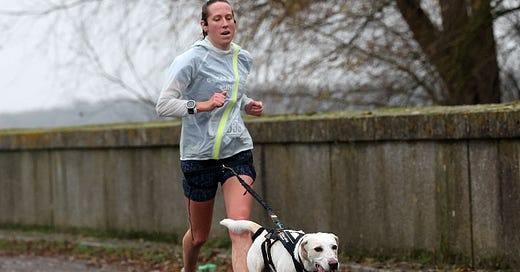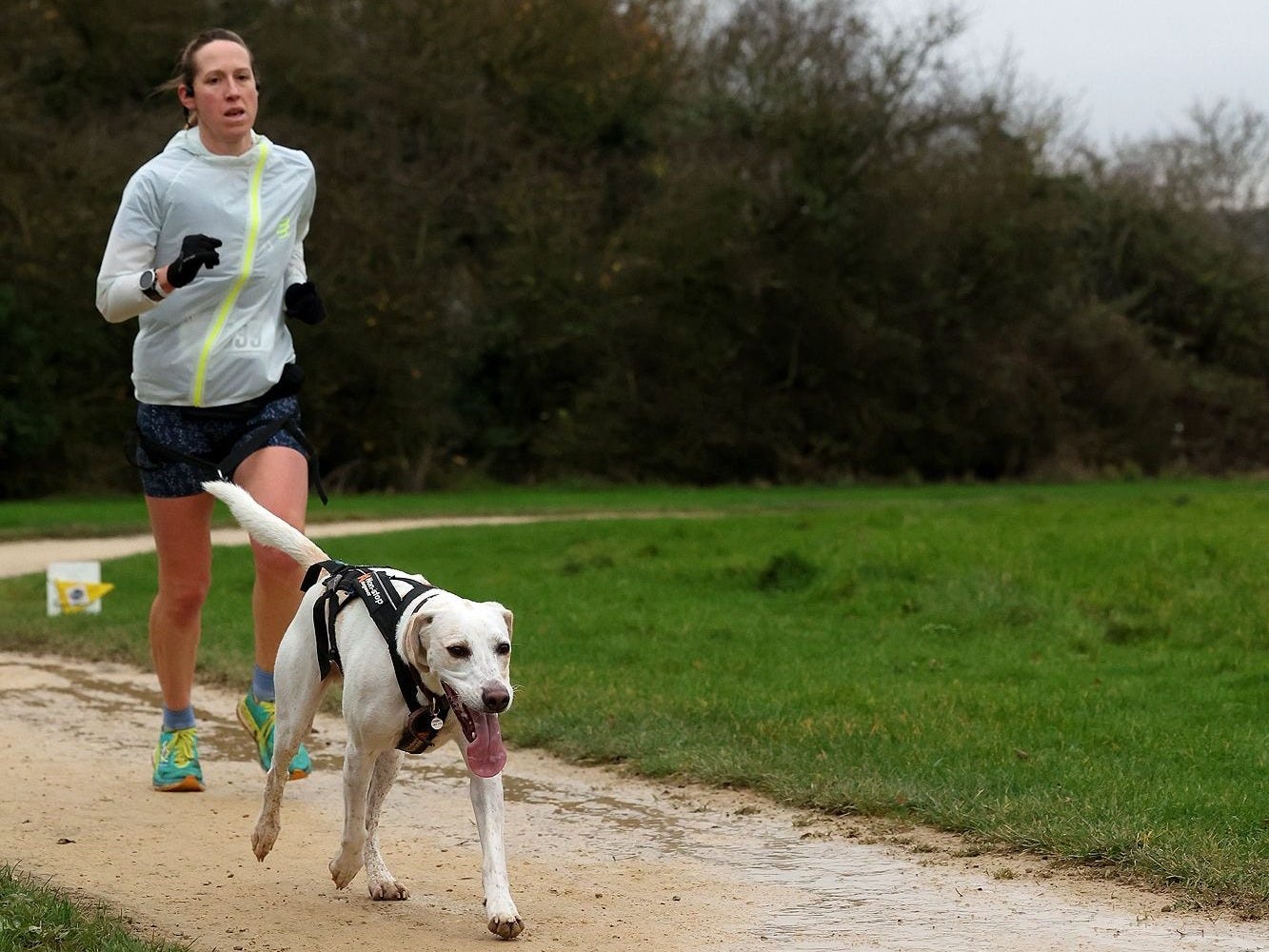“If you were in the Olympics and couldn’t get a gold medal would you rather come second or third?” This is the question my nine-year-old son asks me on a regular basis.
His argument is that a silver medal means you failed to win, while a bronze medal means you managed to scrape a podium position. The former equals commiseration while the latter is a celebration.
I understand his logic. Many silver medallists look disappointed while bronze medallists always seem elated.
And if you come fourth - that is the worst placement of all, because you came so close but it still wasn’t good enough.
That was the position I found myself in last Sunday. I crossed the finish line at the Grafham 10 mile canicross race thinking that I was third female. But my celebration was quickly crushed when they announced the podium winners. When they declared the third place winner I realised there had been a woman ahead of me I hadn’t spotted, meaning I was actually in fourth place.
Something similar happened in the summer. I had been taking part in a weekend of running events (a 25k, 10k and half marathon race) and was in the final one mile dash. Basically the top six runners from the three events have a final race. Whoever wins this one mile is crowned the overall winner - even if they don’t have the fastest accumulative time across the other three races. It was my third time doing the event but the first time I had made it through to the cruel final.
I assumed, wrongly, that there would be a second and third place trophy in the one mile race. I had the third fastest accumulative time over the weekend so I was delighted when I crossed the one miler in second place. I was ready to collect my silver medal. Except there wasn’t one. There were first, second and third places for the 25k, 10k and half marathon races individually, but only a first place trophy for the winner of the one mile dash. Once again I was crushed. Could I have run faster in that final mile if I had known? Rather than kill myself in that final race I ran fast enough to gain second place and hit my target. Only it was a faulty target.
All of this got me thinking about where I went right - and wrong - during my recent canicross race.
What I did right
First I did my research. I don’t go into every race thinking I can podium. I am very much a middle of the pack runner. But in smaller events I know I might have a chance.
I started by looking at the finishing time of the first female last year. The time was 1:14:42 and she came 18 out of 45 runners (female and male). I quickly did some mathletics using the vdot calculator and worked out my pace would need to be 4:38 min/km to beat that time.
I recently ran Leicester Half with an average pace of 4:53 (without my dog). I knew Zippy would pull me for most of the 10-miler and in theory could knock 20+ seconds off my pace. So I set myself the target of running a 4:40 pace with the hope of coming second or third. This seemed a realistic target.
The next wise decision was doing a recce of the route. I arrived a bit early and walked 2km of the course to see how slippy it was. This also gave Zippy an opportunity to have a poo. The last thing I wanted to do was stop during the race to sort out his mess. I decided I would risk wearing my carbon-plated road shoes despite there being some mud and leaves underfoot. This definitely helped me keep up a good pace during the event, and I was glad of the recce.
At the beginning of the race they asked people racing for a podium place to line up first, and then everyone else was set off in waves behind them. As much as I felt like an imposter I decided if I was serious about being a contender I needed to be at the front. This was the right decision because the first 1km was absolute chaos. Zippy charged off at a 3.30km pace which would have been a nightmare had we’d been stuck behind slower runners.
Once the initial bedlam of barking dogs had calmed down I settled into my pace which by kilometre four had levelled out at 4.30 min/km. This felt comfortable so I stuck with it. At this point I could only see one women ahead of me but she was pulling away so I decided I would race for second place. This was a good decision as she finished four minutes ahead of me so was clearly a much faster runner.
What I did wrong
Everything was going well until about mile seven. By this point another woman had caught up with me. I hadn’t see her for the first six miles but I believe she closed the gap when I stopped for about a minute to have some water. I also tried to get the dog to drink but he was having none of it.
In hindsight this was a mistake. I was complacent in my second place position and didn’t think anyone else was close to catching up - but they were. When we got to the second water stop I kept on going, but so did she, and minutes later she overtook me.
As she pulled away I decided there was no point trying to pursue her because I was happy with third place. After all it was better than second, according to my son.
I kept looking over my shoulder and was confident there was no-one else who could catch me. This was correct, as the next female was 11 minutes behind me.
As we reached the final mile I saw the woman in second place ahead of me. I was gaining on her slightly but figured I would have to sprint to catch up with her. I wasn’t sure I had enough left in the tank (I’d only had one gel - I really should have eaten another one). So I did what I could to have a strong finish but didn’t go all out.
In the end she was 50 seconds ahead of me. But what I didn’t realise was another woman was just four seconds ahead of her. I hadn’t clocked this woman at all. She had short hair, was wearing black and was very lean, so I must have assumed she was a man. All along I had been in third place and then fourth place, without realising it.
In the end I was pleased with my performance as I was almost a minute faster than the 2023 female winner and my average pace was 4.29, much quicker than I had estimated. I came 11th out of 67 runners overall and it was my fastest ever race.
But I did have the nagging feeling that I had messed up. If I was in it for a podium position I shouldn’t have stopped so long for water, and I should have done more to catch-up the woman who overtook me. I miscalculated. Like the time I came second (but didn’t get a trophy) I will always be wondering what if I pushed that little bit more?
How to run 100k
I ran a 100km race last Saturday. And no I did not stop for lunch. When I tell people I run ultra marathons (anything longer than a marathon) I am bombarded with questions. Most of them are about food. Some of them are about running. My favourite query about the
That all being said, I don’t always get it wrong. Earlier in the year I won a 100k race. Once I realised at 50km that I was leading the women’s race I hung on for dear life to keep hold of the position. I was quick at checkpoints and every time I hit a bit of tarmac I pushed the pace. It was a stressful experience but proved what was possible.
Of course most people run races for fun - and a lot of the time I do too. But every so often I like to challenge myself when a podium position seems within grasp. Next time I’ll draw on this experience and see if tweaks to my strategy really can make a difference.
Thanks for reading this week’s newsletter. If you have any running news for me, let me know! Send feedback to lilycanter@yahoo.co.uk or suggest topics you’d like me to cover.









Ahhhh you also canicross! :-)
I feel your pain. A few years ago I was in third place overall at a parkrun in Italy. In the last lap I missed the turning and the two guys behind me went past me. So now although my result still says 1 female, I didn’t get the 3 overall spot and it always bugs me when I view my parkrun results page.